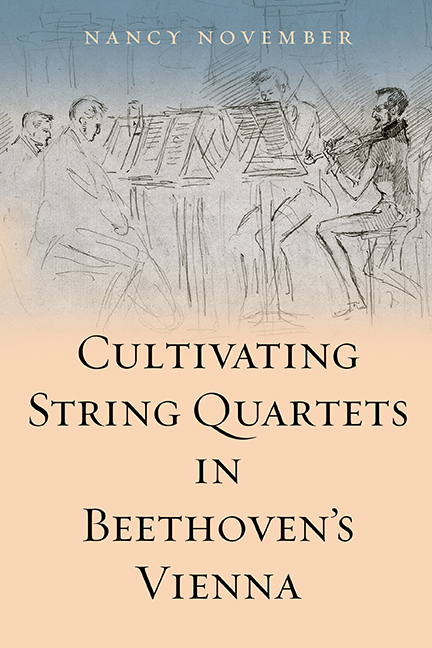Book contents
- Frontmatter
- Contents
- List of Illustrations
- List of Musical Examples
- Acknowledgements
- Introduction
- 1 Defining Chamber Music in the Early Nineteenth Century
- 2 Celebrating Haydn, Cultivating Opera
- 3 Selling String Quartets in Beethoven's Vienna
- 4 Locating String Quartets in Beethoven's Vienna
- 5 Early Nineteenth-Century Performance and Criticism
- 6 Sociability, Showmanship, and Study: ‘Quartet Friends’
- 7 The String Quartet and the Listener
- 8 Schubert's Song, Beethoven's Theatricality
- Epilogue: Constructing ‘Viennese Chamber Music’
- Bibliography
- Index
7 - The String Quartet and the Listener
Published online by Cambridge University Press: 16 May 2018
- Frontmatter
- Contents
- List of Illustrations
- List of Musical Examples
- Acknowledgements
- Introduction
- 1 Defining Chamber Music in the Early Nineteenth Century
- 2 Celebrating Haydn, Cultivating Opera
- 3 Selling String Quartets in Beethoven's Vienna
- 4 Locating String Quartets in Beethoven's Vienna
- 5 Early Nineteenth-Century Performance and Criticism
- 6 Sociability, Showmanship, and Study: ‘Quartet Friends’
- 7 The String Quartet and the Listener
- 8 Schubert's Song, Beethoven's Theatricality
- Epilogue: Constructing ‘Viennese Chamber Music’
- Bibliography
- Index
Summary
It was infinitely full, and the trio as well as the quartet in particular were very much applauded; it also went together very well and Linke played better than ever. It was too crowded to hear much; but this much I did hear, that many passages were accompanied by exclamations, and upon leaving many people spoke of the beauty of the new quartet. For this reason Schuppanzigh wants to play it again in 14 days.
Viennese critics expressed their views powerfully, but Viennese audiences had the first say. Lively, loquacious audiences feature prominently in this report from the Schuppanzigh Quartet's second violinist Holz. The occasion was the 1825 premiere of Beethoven's String Quartet in A minor Op. 132. Such behaviour from an audience might seem out of place according to the standards of silence and decorum at concerts of classical music today. It leads us to wonder how common this kind of response was, which passages were the most acclaimed, and why this audience reacted in this way. To answer these questions, we need to think about who formed the audience at Viennese chamber music concerts, both private and more public, and what kinds of listening experiences they may have had.
The case of the Viennese string quartet in the early nineteenth century is instructive for the history of listening. It exhibits an early, determined attempt by certain performers, composers, and critics to shift audience behaviour and listening practices towards silent, detached, reverent contemplation. This effort will be seen to have failed at least partially, since audiences persisted in more interactive ways of listening. However, the ideological seeds of silent listening were sown, and Viennese chamber music would provide fertile ground for ‘reforming’ listeners, as it came to be perceived at least by some of those involved. First, though, it is helpful to set Holz's comments in the broader context of nineteenth-century listening practice, which means considering an on-going debate over the nature of ‘period’ listening.
Did they Listen in the Early Nineteenth Century?
Scholars who study listening practices are united in the view that the nineteenth century witnessed a fundamental change in the character of listening.
- Type
- Chapter
- Information
- Cultivating String Quartets in Beethoven's Vienna , pp. 176 - 197Publisher: Boydell & BrewerPrint publication year: 2017



